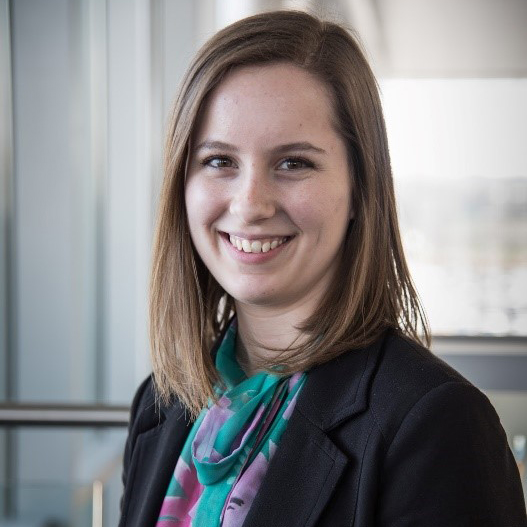JoAnna Ness
Location: Berlin, Germany
Learn more about this program »
Major: M.A. in Philanthropic Studies, Graduate Certificate in Nonprofit Management
Program Name: Germany: Philanthropy and Public Policy
What’s your best memory from your time abroad?
We had the opportunity to meet nonprofit management students studying at the Universität Hamburg. As they generously shared lectures, dinner, and a city tour with us, we learned about their experiences in Germany’s nonprofit sector and gained a glimpse into life as a student abroad.
Academic Planning
This course fulfilled the cross cultural study requirement for my master’s degree. Through readings about German nonprofits, foundations, and the regulations and culture that shape their work, we learned the academic side of German philanthropy. Our readings gained context through daily lectures and discussions with academics and nonprofit professionals, as well as a research paper conducted on a current issue that is being addressed by the German nonprofit sector.
Money Matters
Most of our meals, lodging, and daily transportation costs were paid for in advance through tuition fees, so we saved money for occasional dinners at restaurants and souvenirs. Some students chose to travel to other places, either before or after our abroad course, in order to maximize their time overseas. Our favorite days were often inexpensive, including an inexpensive bus ride to a park, grabbing a drink at an interesting place, and even playing card games in our hotel.
Locals
In general, we were able to easily communicate with people in Berlin, and most people spoke English extremely well. We tried to remain conscious of the differences in cultural expectations and offered respect to common etiquette by observing how others acted in a situation, and as a result we felt welcomed and comfortable in the midst of Berliners.
Cultural Adjustment
Most of my fellow classmates felt quite comfortable and experienced little culture shock in adjusting to Berlin life for the short time we were there. It was always best to carry cash and either ask to split bills in the beginning or arrange a way to pay each other. Once we understood the ticketing process, many of us enjoyed the change to using a variety of public transportation to navigate the city. Perhaps the biggest adjustment was the walking we did each day, with upwards of 8 miles some days.
Leisure & Travel
The course includes a day trip to Potsdam, where we visited many historical sites, including the palace where the Potsdam Conference was held and leaders from the United States, United Kingdom, and Soviet Union met to work on establishing peace after WWII. There was also an optional day trip to Sachsenhausen, which was a Nazi concentration camp primarily used for political prisoners. Although this was a difficult and somber experience, many of the students who elected to go felt it was very powerful. We also had most evenings free to explore museums and historical sites in Berlin, including the East Side Gallery and the Topographie des Terrors.
Advice
I thoroughly enjoyed this opportunity to study philanthropy in another culture and see the readings come to life through the course. I would suggest students research Berlin’s most famous museums and places, and make a list of the sites they would most like to see. Since the course is fairly short, I would highly encourage any student to complete the readings in advance so that free time can be utilized learning the city. I’d also highly recommend students research the current political and national news in Germany, to provide better context for the discussions with local professionals.
Effect on Career Goals
Studying in Germany provided a greater cultural understanding that I could never have gained through my time in school alone. As with my undergraduate experience studying in Dublin, Ireland for a semester, I walked away from this course with a better respect for other nations, for the complicated history that connects us all, and for people of different backgrounds. I gained more confidence in my ability to navigate unfamiliar situations, as well as greater flexibility and patience living and traveling in close proximity with a small group of people. I’ll utilize all of these skills and my increased cultural understanding in my career as I interact with a wide variety of people.
Advice
I grew up hearing stories from my grandparents who travelled, as well as my cousins about the time they spent abroad and saw how they grew from their experiences, which motivated me to research and take advantage of study abroad opportunities in both my undergraduate and graduate studies. I’d recommend any student who is nervous about traveling connect with people who have completed study abroad programs in the countries they hope to visit, so they can learn about navigating the everyday challenges of living abroad as well as the intricacies of applying for the program, booking international flights, and planning your time abroad. For students who hope to travel “someday” and see the world “in the future,” I would encourage them to take advantage of study abroad now, while they can gain credits, meet new people, and experience an entirely different way of life within the very accessible structure of a school program.

